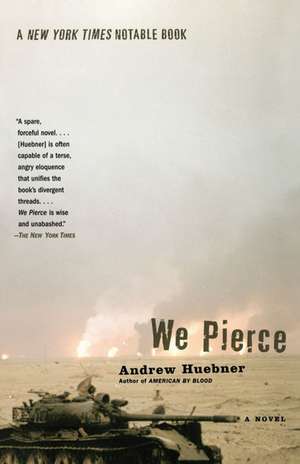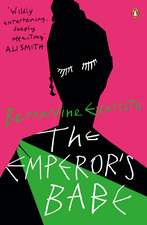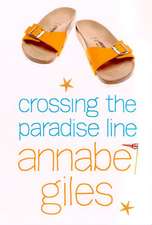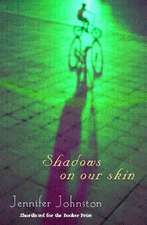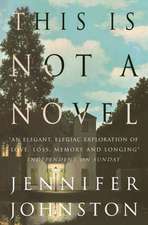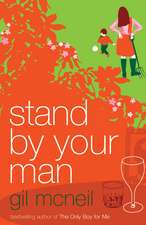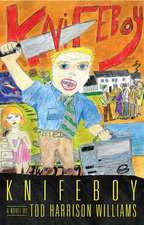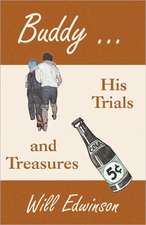We Pierce: A Novel
Autor Andrew Huebneren Limba Engleză Paperback – 16 aug 2004
Preț: 110.08 lei
Nou
Puncte Express: 165
Preț estimativ în valută:
21.06€ • 22.05$ • 17.43£
21.06€ • 22.05$ • 17.43£
Carte disponibilă
Livrare economică 15-29 martie
Preluare comenzi: 021 569.72.76
Specificații
ISBN-13: 9780743212786
ISBN-10: 0743212789
Pagini: 288
Dimensiuni: 140 x 216 x 18 mm
Greutate: 0.31 kg
Ediția:Reprint
Editura: Simon&Schuster
Colecția Simon & Schuster
ISBN-10: 0743212789
Pagini: 288
Dimensiuni: 140 x 216 x 18 mm
Greutate: 0.31 kg
Ediția:Reprint
Editura: Simon&Schuster
Colecția Simon & Schuster
Notă biografică
Andrew Huebner lives in Los Angeles. He is the author of American by Blood.
Extras
Chapter 1
Zero hour,
a 767 jet plane,
276 soldiers,
an M-16 apiece,
rucksack,
full desert camouflage fatigues, the same boots, socks and underwear, different smells, beliefs and mother's marks on their foreheads.
The second of August, 1990, Saddam Hussein's Iraqi forces, three full divisions and one of special forces, one hundred thousand troops, tanks, trucks and armored personnel carriers crossed the Kuwaiti border. The Iraqis took control of Kuwait City and the country's oil wells in forty-eight hours. George Herbert Walker Bush, the forty-first president of the United States, condemned Iraq's act of naked aggression and called on the United Nations to respond. By August 5, President Bush drew a line in the sand and planted the Stars and Stripes at the Saudi Arabian border.
Sergeant E-5 Smith Huebner's tank company, D, the Dark Lords, would be part of that line. Less than two weeks later as part of the 66th Infantry, 1st Battalion, 64th Armor, United States Army, Huebner boarded a plane for the Arabian desert. His mind was imprinted with Hollywood images, combat skills enhanced by computer simulation. He had never visited violence upon another man on command. In theory, he could kill with his weapon or his hands; Huebner was really good with his hands. Guys liked to have him around when they took on Marines or sailors in bar fights, trading battle techniques and drinking formations. They fought Marines on Hay Street in Fayetteville, North Carolina, near Camp Lejeune, and sailors on Virginia Beach at the base in Norfolk.
Years of indoctrination and relentless training shut away any doubts that might have lingered outside the vacuum-sealed windows of the brand-new plane, that they could lose, that they were just organisms of wingless flesh flying against the wishes of God in a gigantic piece of galvanized tin, a folly held together by a mathematical equation of physics they had never paid attention to in boring math classes, written by a nerd with horn-rimmed glasses they had outrun on the playground and only picked for the team because they felt sorry for him. It was part of their destiny to win any fight and bear any burden not because they were right or stronger of will or sent by God as other warriors of ages past, but because they were born in America from where the best machines of death were spawned, from the Gatling gun that eviscerated the Indians, to the mushroom cloud that burned the Japanese alive.
Most Americans had to watch the Special Reports on the news that interrupted their soap operas, ball games or the new fake real shows like Current Affair and Cops to learn exactly where Kuwait was. Smith's brother Sam called that Sunday when Bush made his speech. No one had cared about the Middle East since Reagan had gotten the hostages back from Iran. Hadn't Iraq been our friend then?
You're not going, are you?
We're the first to fight, Smith replied, his voice dropping a register.
The soldiers were given war manuals to read: entries on the human dimension of warfare, sign communication with the enemy, first aid for melted skin. They were offered pocket New Testaments and small American flags, the kind little boys wave at the old soldiers at Memorial Day parades. Conversations started and ended without anyone noticing.
Smith had a note his wife had written for his leaving and slipped into his hand the last morning he left for the post.
Don't read this until you're on the way, Meg had written. God, even her handwriting is sexy, he thought. His wife had kidded him about how horny he was since he'd gotten the call in the middle of the night from his immediate superior.
Hey, war is sexy, he teased back.
I ain't complaining.
Sergeant Huebner opened the fold and looked at her words:
It looks like you're going to be a daddy. I didn't know how to tell you. Don't worry. I'm very happy. I haven't been to the doctor yet, so cross your fingers. I love you and miss you. Don't be gone long.
Huebner hollered, then he remembered where he was. A couple soldiers looked around, but they took his enthusiasm for war excitement and pumped their fists.
He stared out the window or at the back of the soldier's head in front. This soldier had a spot on his shirt. This consoled Huebner: he had a clean shirt. His wife had worn it to bed with him and then washed it fresh. Things like a clean shirt mattered. The other would die, certainly. Huebner walked to the bathroom, past one soldier sleeping with his mouth wide open; another biting skin off his fingers; a third staring, inappropriately, in Smith's direction. When Huebner raised his eyebrows, this soldier never blinked.
No movie. Twelve hours, waking sleep and taut nerves. In another hemisphere they saw the first F-15 Eagles. Someone shouted, the plane trembled, they actually felt them. Huebner looked out his window at blips of streaking metal, bursts of pure heat force that ate the air and obliterated gravity. The soldiers counted aloud, one, two, three, four, five. The fighter jets made everything, the black-blue night sky, the stars, a part of their background shot. Huebner watched the trails disappear; the same firepower that guarded his life could kill him in an instant.
He thought of what a captain he knew once told him at the National Training Center. Huebner liked him; he was really squared away.
You treat your weapon like she's your wife. Make sure she's always with you and ready for war, son, Captain Anderson said. Once he held up an envelope. Be careful, he said, check everything three times, or this is how you come home.
At the port of Dammam, the soldiers trooped off the plane into an open-air oven, then bused to a dark warehouse that smelled like a toilet. Flies hovered brazenly over the black filth on the floor; soldiers batted with their hands, cursed, squashed vermin with their boots and spread sleeping bags. Huebner spit a couple times, lay down, closed his eyes and wished for sleep.
A couple hours later, he jerked up, his brain reeling between time zones. He rubbed his eyes and looked around at the ranks of men trying to catch up on their sleep in the middle of the day. No protection, no aircraft carriers or destroyers. A single battalion of fifty-eight Sheridan tanks from the 82nd Airborne Division rumbled outside. These air-deployable reconnaissance vehicles had arrived ahead of the soldiers to secure the airport and escort them to the warehouses. The ADRs weren't heavily armored; they would lose a real firefight against Iraq's Soviet T-72s.
Half-asleep, Huebner was thinking of his wife. An alarm sounded, Whoop, whoop, whoop, an M-8 box with a chemical sensor. Shouts, groans, one soldier jumped up and ran across the waking others in his underwear. Yells of, Gas, gas, gas were muffled as masks were pulled over faces. Soldiers fumbled half-asleep for gear; they were living in their MOPP 2 suits. Mask first, in nine seconds flat. Huebner blew to clear, flipped the hood over his head, then cinched the straps secure under his arms. The gloves came last and his weapon. Huebner jumped to his feet, but someone had thrown up on the floor; he slipped, fell on his ass, and said, Goddamn.
Welcome to the war, boys, some hammy colonel called, laughing. It was only a drill. NBC, as in nuclear, biological and chemical. The colonel stood on a jerrybuilt wood platform, waving his pro-mask. He imitated the M-8 box, Whoop, whoop, whoop.
He's lucky he doesn't get himself shot, someone said.
Huebner almost tore off his ear when he removed the mask. It hurt, a lot, but he played it off like it was cool; all of them did.
Sleep disturbed, soldiers lay back down and waited for orders. A few talked shit and tried to chat up the few females, to cover up worries of home and the enemy, to try to create normalcy in all that man-made squalor and tension. As a target, the warehouse made them nervous. They all knew about Beirut, ten years before. Two hundred fifty soldiers blown to pieces. The enemy had driven a truck right up to the handicapped parking.
Huebner stowed his mask in his duffel bag and went toward the giant tin sliding doors. Soldiers traded off turns walking outside and down to the water. A breeze, hot and dry, rippled the clear blue seawater: the wind bent the tall grass down toward the earth, lapped the water at their feet in the shallows, turned over the whitecaps in the deep. The setting sun glittered off the surface and turned the blue to silver. His sweat dried on his skin, hot wind, harsh heat, a hammer and anvil squeezing all thought from his brain, turning consciousness itself into a lingering, lazy museful wish for coolness, and every wheezing breath into a reverent psalm for release, deliverance from the harsh, unforgiving heat.
Huebner looked back at an American flag already flying in front of the warehouse. He listened to the flap of the canvas in the strong wind.
You see how dirty that place is?
A soldier named Fredericksen had spoken. When he took off his helmet, his blond hair glowed in the waning dusk light. He'd been out in the sun or he had some dye in it, some L.A. thing. A radioman, he was skinny, his uniform billowed off his body in the wind.
Welcome to Kuwait, Huebner said.
I thought this was Saudi, the radioman said.
Saudi Arabia, a third said. We're in Dammam.
Huebner looked at the moon reflected on the calm bay water.
Whatever, he said.
You scared?
Me? Hell no, Huebner said.
Right, me neither, Fredericksen said. Both of them laughed, then cut it short and resumed their complaints. There was the food, the heat, the filth, better to talk about all that.
Never were the markings on the face of the moon so clear. Blown sand danced through the night sky and spiraled toward the earth in the hot, dry wind. The incandescent brilliance of the moon and the stars turned the drifting sand into a curtain of fluorescence that draped to the desert floor.
Huebner walked back to the warehouse, flinching at the clattering noise of Black Hawk takeoffs. From the elite Delta Company, they hovered overhead then shot out, graceful as hawks, headed for reconnaissance missions near the Iraqi-held Kuwait border. A truck thundered by; the driver smiled through the window and pointed at the helicopters. Huebner flashed a thumbs-up and scrambled out of the way. The trucks carried tanks as they were loaded off ships arriving each day in the Gulf. These fast surface ships, gray Navy cargo carriers that can run to thirty-three knots in open sea, left the Bay of Savannah the day after the invasion of Kuwait and sailed through the Suez Canal. The Army loaded them so heavily their hulls stuck in the shallow waters of the Savannah Harbor. The captains pitched their ships to starboard at full tilt to rock them out of the muck at the river bottom and out to sea.
Huebner wondered which load had his tank. He was trained to shoot the big gun and he felt sketchy, out of place, waiting on the ground. He felt anxious to climb inside his beast and roll.
Huebner stood by the door of the warehouse and watched new arrivals. For every two who would face combat three soldiers worked on support, checking engines and organizing supplies for anticipated troop movements. Army advance teams set up Bedouin-style tents in forward camps where their stronghold gave way at its perimeter to the true Arabian terrain, miles and miles of dry sand, dirt and dune. All makes of jets and cargo planes passed one after another, taxiing in and out of position. Giant flatbed K-loaders full of supplies and equipment, clumsy in the sand, shuttled between the planes and the dock areas. Huebner tried to get some air, mind his own business and stay out of the way. Captain Jobe found him there.
The captain laughed, spat a wad of tobacco on the ground, reached into his pocket and placed a fresh wad in his cheek. A big man, from Nebraska, at least six-four, a little overweight for a captain, he clapped his hands and pointed toward a Humvee.
Meet me there with your weapon and gear in five, Got it?
Yes, sir.
Thunder boomed and crackled, the heat lit up the night then echoed far off in the darkness. Sultry sea breezes blew the sand against their windshield with a rasp, as if the humid, heavy night air was suffocating the wind. The troops left some time after midnight. A single road linked the oil ports and ran alongside the main oil pipeline across Saudi Arabia all the way to Jordan. Captain Jobe and Sergeant Huebner took lead, the lonely vulnerable tip of the arrow. Their job was to take the first convoy of tanks into the desert. Crews loaded the tanks onto twelve flatbed heavy equipment transfer or HET trucks, manned by Saudi Army National Guard soldiers and Filipinos, not mercenaries -- they were in a war zone with no visible weapons -- just men looking for work far away from home. Captain Jobe had his sidearm, a
.45-caliber pistol, and Huebner, an M-16. Yellow super-glow headlights beamed onto the asphalt highway. Sometime in the night the caravan drove past a van wrecked on the side of the road. Smoke billowed from the shoulder, thick and colored green in the phosphorescence of their headlights. Orange flames licked out of the broken windows of the wrecked Chevy. Had it been hit? Would they be next?
A flash of lightning lit up the sky for a moment. Huebner and the captain both flinched, but they drove on. At dawn the sky lightened to a glistening powder blue edged in gold and yellow. Some of the trucks behind them pulled off the road. Jobe said, Let's stop and see what's going on.
Huebner slowed down and pulled two of the Humvee's wheels carefully onto the soft grainy shoulder. A few trucks followed; others went speeding by down the highway. An Arab driver stopped his truck in the middle of the highway, hopped out, spread out a mat and kneeled to face the sun, just a hint of light in the distant purple horizon. They're praying, sir, Huebner said. No shit, Jobe said. Let me get a count. You stay here, Jobe said, and went off walking down the road. Sergeant Huebner stood and watched the silhouettes of the men kneeling beside shadowed trucks. He daydreamed as he watched. In church back home the parishioners would call them heathens. Was there a difference between these men and their enemies? To pray five times a day seemed pretty devout. Huebner was once a week, at best. He wondered if the prayers were just dogma. Maybe Arabs thought of it like breathing and maybe that was better. Or did they wish for things, to be back home, or some special place back in Iran or Yemen? Did they wish to be American? Huebner wondered, with extra money to spend at the 7-Eleven on Slurpees, or to have grown up doing bong hits or trying to make girls in the backseats of old Dodges listening to REM. Or did they frown on everything American and pray for their own version of the good life? They moved out and arrived in the initial assembly area two hours later. An Arab man ran out into the highway and waved their Humvee over to the side of the road. Huebner followed Jobe's gaze out the window. Already some green Army trucks and jeeps gathered around a makeshift scrap metal and chain link corral. Five camels trotted nervously in circles. The man on the ground was dressed in ragged, dirty cotton pull-string drawers, skinny, with rope sandals and a faded Adidas T-shirt. Must be his camels, Jobe said dryly.
A couple other officers waved at Jobe from a tent a hundred yards beyond the corral. The captain waved back then shuffled through the deep sand toward the tent, a hand to his face as the hot wind blew the sand in his eyes. As another truck rolled in, the Arab ran out into the highway, directing the truck to the side of his corral. Huebner yelled at him, held up his hands, pointed at his own chest. The Arab nodded thankfully then went inside the corral to tend his nervous camels. He pulled one by the reins and patted its flank. The tall, gawky animals almost hopped, on all four legs, without the fierce dignity and grace of a horse's trot, more like giant spiders.
Each truck or bus followed the next, filling up the great field of sand, scraggly weeds and coarse brown sticker bushes. Hot and dusty, soldiers trooped in line out of the buses, set down their packs to rest away from the road. The hired drivers lay down in the scant shade provided by their trucks. Huebner stood out in the road, waving the trucks in. He heard shouting and turned to see the Arab with a blue ceramic bowl filled with a bubbly white liquid and a dirty water glass. He poured a glassful for Huebner, laid the bowl down and pointed at the camels. You got to be kidding, Huebner said. The man smiled and bobbed his head. Thank you, Huebner nodded. The milk smelled like livestock, but he drank it anyway. It was warm and heavy. When the Arab walked away smiling, with his glass and ceramic bowl, Huebner hustled over the sand to their Hummer and grabbed a bottle of water. Thirty minutes later Jobe finally came over and told him, Get some shut-eye in the Hummer. I'll call you when I need you.
Yes sir, I'll do that.
Huebner woke to someone shouting, glanced quickly at his watch, 1200 hours, asleep since nine. A transport had run over the heads of two of the drivers, gone to sleep in the shadow of the trucks, a mess of blood, bone and brain. Huebner turned away then looked back again. Most of the soldiers had probably never seen anyone dead either. Huebner didn't want to seem soft. Something about the hollowed-out feeling it gave him felt cool, like when he was in high school, after he got the wind knocked out of him in a football game. Next to him a lieutenant named Schwartz had the dry heaves. Schwartz had evidently waved on the trucks. He was just a young man with a mop of short curly hair when his desert floppy hat blew off in the wind.
Shit, they look like their heads exploded, Schwartz said.
His face was pale; two soldiers had to pull him away. He got free, ran a couple steps in the deep sand toward the dead men like he thought he could help them. A little swirl of sand as fine as talcum powder, blown by the wind, had already begun to cover what was left of their faces. Captain Jobe was there.
You want me to call this in to command, another lieutenant said, walking up. But he cut himself off and backed away when he saw Schwartz's face.
Already called command, Jobe said. They're gonna send over some body bags. Gibson, he said to the lieutenant. See if you can find some ID on them. Bag 'em and send 'em back on next supply truck.
Yes, sir, Gibson said.
It wasn't your fault, Jobe said to Schwartz and patted the lieutenant's shoulder. It was the easy thing to say because everyone knew it was Schwartz's fault. He knew it himself.
Copyright © 2003 by Andrew Huebner
Zero hour,
a 767 jet plane,
276 soldiers,
an M-16 apiece,
rucksack,
full desert camouflage fatigues, the same boots, socks and underwear, different smells, beliefs and mother's marks on their foreheads.
The second of August, 1990, Saddam Hussein's Iraqi forces, three full divisions and one of special forces, one hundred thousand troops, tanks, trucks and armored personnel carriers crossed the Kuwaiti border. The Iraqis took control of Kuwait City and the country's oil wells in forty-eight hours. George Herbert Walker Bush, the forty-first president of the United States, condemned Iraq's act of naked aggression and called on the United Nations to respond. By August 5, President Bush drew a line in the sand and planted the Stars and Stripes at the Saudi Arabian border.
Sergeant E-5 Smith Huebner's tank company, D, the Dark Lords, would be part of that line. Less than two weeks later as part of the 66th Infantry, 1st Battalion, 64th Armor, United States Army, Huebner boarded a plane for the Arabian desert. His mind was imprinted with Hollywood images, combat skills enhanced by computer simulation. He had never visited violence upon another man on command. In theory, he could kill with his weapon or his hands; Huebner was really good with his hands. Guys liked to have him around when they took on Marines or sailors in bar fights, trading battle techniques and drinking formations. They fought Marines on Hay Street in Fayetteville, North Carolina, near Camp Lejeune, and sailors on Virginia Beach at the base in Norfolk.
Years of indoctrination and relentless training shut away any doubts that might have lingered outside the vacuum-sealed windows of the brand-new plane, that they could lose, that they were just organisms of wingless flesh flying against the wishes of God in a gigantic piece of galvanized tin, a folly held together by a mathematical equation of physics they had never paid attention to in boring math classes, written by a nerd with horn-rimmed glasses they had outrun on the playground and only picked for the team because they felt sorry for him. It was part of their destiny to win any fight and bear any burden not because they were right or stronger of will or sent by God as other warriors of ages past, but because they were born in America from where the best machines of death were spawned, from the Gatling gun that eviscerated the Indians, to the mushroom cloud that burned the Japanese alive.
Most Americans had to watch the Special Reports on the news that interrupted their soap operas, ball games or the new fake real shows like Current Affair and Cops to learn exactly where Kuwait was. Smith's brother Sam called that Sunday when Bush made his speech. No one had cared about the Middle East since Reagan had gotten the hostages back from Iran. Hadn't Iraq been our friend then?
You're not going, are you?
We're the first to fight, Smith replied, his voice dropping a register.
The soldiers were given war manuals to read: entries on the human dimension of warfare, sign communication with the enemy, first aid for melted skin. They were offered pocket New Testaments and small American flags, the kind little boys wave at the old soldiers at Memorial Day parades. Conversations started and ended without anyone noticing.
Smith had a note his wife had written for his leaving and slipped into his hand the last morning he left for the post.
Don't read this until you're on the way, Meg had written. God, even her handwriting is sexy, he thought. His wife had kidded him about how horny he was since he'd gotten the call in the middle of the night from his immediate superior.
Hey, war is sexy, he teased back.
I ain't complaining.
Sergeant Huebner opened the fold and looked at her words:
It looks like you're going to be a daddy. I didn't know how to tell you. Don't worry. I'm very happy. I haven't been to the doctor yet, so cross your fingers. I love you and miss you. Don't be gone long.
Huebner hollered, then he remembered where he was. A couple soldiers looked around, but they took his enthusiasm for war excitement and pumped their fists.
He stared out the window or at the back of the soldier's head in front. This soldier had a spot on his shirt. This consoled Huebner: he had a clean shirt. His wife had worn it to bed with him and then washed it fresh. Things like a clean shirt mattered. The other would die, certainly. Huebner walked to the bathroom, past one soldier sleeping with his mouth wide open; another biting skin off his fingers; a third staring, inappropriately, in Smith's direction. When Huebner raised his eyebrows, this soldier never blinked.
No movie. Twelve hours, waking sleep and taut nerves. In another hemisphere they saw the first F-15 Eagles. Someone shouted, the plane trembled, they actually felt them. Huebner looked out his window at blips of streaking metal, bursts of pure heat force that ate the air and obliterated gravity. The soldiers counted aloud, one, two, three, four, five. The fighter jets made everything, the black-blue night sky, the stars, a part of their background shot. Huebner watched the trails disappear; the same firepower that guarded his life could kill him in an instant.
He thought of what a captain he knew once told him at the National Training Center. Huebner liked him; he was really squared away.
You treat your weapon like she's your wife. Make sure she's always with you and ready for war, son, Captain Anderson said. Once he held up an envelope. Be careful, he said, check everything three times, or this is how you come home.
At the port of Dammam, the soldiers trooped off the plane into an open-air oven, then bused to a dark warehouse that smelled like a toilet. Flies hovered brazenly over the black filth on the floor; soldiers batted with their hands, cursed, squashed vermin with their boots and spread sleeping bags. Huebner spit a couple times, lay down, closed his eyes and wished for sleep.
A couple hours later, he jerked up, his brain reeling between time zones. He rubbed his eyes and looked around at the ranks of men trying to catch up on their sleep in the middle of the day. No protection, no aircraft carriers or destroyers. A single battalion of fifty-eight Sheridan tanks from the 82nd Airborne Division rumbled outside. These air-deployable reconnaissance vehicles had arrived ahead of the soldiers to secure the airport and escort them to the warehouses. The ADRs weren't heavily armored; they would lose a real firefight against Iraq's Soviet T-72s.
Half-asleep, Huebner was thinking of his wife. An alarm sounded, Whoop, whoop, whoop, an M-8 box with a chemical sensor. Shouts, groans, one soldier jumped up and ran across the waking others in his underwear. Yells of, Gas, gas, gas were muffled as masks were pulled over faces. Soldiers fumbled half-asleep for gear; they were living in their MOPP 2 suits. Mask first, in nine seconds flat. Huebner blew to clear, flipped the hood over his head, then cinched the straps secure under his arms. The gloves came last and his weapon. Huebner jumped to his feet, but someone had thrown up on the floor; he slipped, fell on his ass, and said, Goddamn.
Welcome to the war, boys, some hammy colonel called, laughing. It was only a drill. NBC, as in nuclear, biological and chemical. The colonel stood on a jerrybuilt wood platform, waving his pro-mask. He imitated the M-8 box, Whoop, whoop, whoop.
He's lucky he doesn't get himself shot, someone said.
Huebner almost tore off his ear when he removed the mask. It hurt, a lot, but he played it off like it was cool; all of them did.
Sleep disturbed, soldiers lay back down and waited for orders. A few talked shit and tried to chat up the few females, to cover up worries of home and the enemy, to try to create normalcy in all that man-made squalor and tension. As a target, the warehouse made them nervous. They all knew about Beirut, ten years before. Two hundred fifty soldiers blown to pieces. The enemy had driven a truck right up to the handicapped parking.
Huebner stowed his mask in his duffel bag and went toward the giant tin sliding doors. Soldiers traded off turns walking outside and down to the water. A breeze, hot and dry, rippled the clear blue seawater: the wind bent the tall grass down toward the earth, lapped the water at their feet in the shallows, turned over the whitecaps in the deep. The setting sun glittered off the surface and turned the blue to silver. His sweat dried on his skin, hot wind, harsh heat, a hammer and anvil squeezing all thought from his brain, turning consciousness itself into a lingering, lazy museful wish for coolness, and every wheezing breath into a reverent psalm for release, deliverance from the harsh, unforgiving heat.
Huebner looked back at an American flag already flying in front of the warehouse. He listened to the flap of the canvas in the strong wind.
You see how dirty that place is?
A soldier named Fredericksen had spoken. When he took off his helmet, his blond hair glowed in the waning dusk light. He'd been out in the sun or he had some dye in it, some L.A. thing. A radioman, he was skinny, his uniform billowed off his body in the wind.
Welcome to Kuwait, Huebner said.
I thought this was Saudi, the radioman said.
Saudi Arabia, a third said. We're in Dammam.
Huebner looked at the moon reflected on the calm bay water.
Whatever, he said.
You scared?
Me? Hell no, Huebner said.
Right, me neither, Fredericksen said. Both of them laughed, then cut it short and resumed their complaints. There was the food, the heat, the filth, better to talk about all that.
Never were the markings on the face of the moon so clear. Blown sand danced through the night sky and spiraled toward the earth in the hot, dry wind. The incandescent brilliance of the moon and the stars turned the drifting sand into a curtain of fluorescence that draped to the desert floor.
Huebner walked back to the warehouse, flinching at the clattering noise of Black Hawk takeoffs. From the elite Delta Company, they hovered overhead then shot out, graceful as hawks, headed for reconnaissance missions near the Iraqi-held Kuwait border. A truck thundered by; the driver smiled through the window and pointed at the helicopters. Huebner flashed a thumbs-up and scrambled out of the way. The trucks carried tanks as they were loaded off ships arriving each day in the Gulf. These fast surface ships, gray Navy cargo carriers that can run to thirty-three knots in open sea, left the Bay of Savannah the day after the invasion of Kuwait and sailed through the Suez Canal. The Army loaded them so heavily their hulls stuck in the shallow waters of the Savannah Harbor. The captains pitched their ships to starboard at full tilt to rock them out of the muck at the river bottom and out to sea.
Huebner wondered which load had his tank. He was trained to shoot the big gun and he felt sketchy, out of place, waiting on the ground. He felt anxious to climb inside his beast and roll.
Huebner stood by the door of the warehouse and watched new arrivals. For every two who would face combat three soldiers worked on support, checking engines and organizing supplies for anticipated troop movements. Army advance teams set up Bedouin-style tents in forward camps where their stronghold gave way at its perimeter to the true Arabian terrain, miles and miles of dry sand, dirt and dune. All makes of jets and cargo planes passed one after another, taxiing in and out of position. Giant flatbed K-loaders full of supplies and equipment, clumsy in the sand, shuttled between the planes and the dock areas. Huebner tried to get some air, mind his own business and stay out of the way. Captain Jobe found him there.
The captain laughed, spat a wad of tobacco on the ground, reached into his pocket and placed a fresh wad in his cheek. A big man, from Nebraska, at least six-four, a little overweight for a captain, he clapped his hands and pointed toward a Humvee.
Meet me there with your weapon and gear in five, Got it?
Yes, sir.
Thunder boomed and crackled, the heat lit up the night then echoed far off in the darkness. Sultry sea breezes blew the sand against their windshield with a rasp, as if the humid, heavy night air was suffocating the wind. The troops left some time after midnight. A single road linked the oil ports and ran alongside the main oil pipeline across Saudi Arabia all the way to Jordan. Captain Jobe and Sergeant Huebner took lead, the lonely vulnerable tip of the arrow. Their job was to take the first convoy of tanks into the desert. Crews loaded the tanks onto twelve flatbed heavy equipment transfer or HET trucks, manned by Saudi Army National Guard soldiers and Filipinos, not mercenaries -- they were in a war zone with no visible weapons -- just men looking for work far away from home. Captain Jobe had his sidearm, a
.45-caliber pistol, and Huebner, an M-16. Yellow super-glow headlights beamed onto the asphalt highway. Sometime in the night the caravan drove past a van wrecked on the side of the road. Smoke billowed from the shoulder, thick and colored green in the phosphorescence of their headlights. Orange flames licked out of the broken windows of the wrecked Chevy. Had it been hit? Would they be next?
A flash of lightning lit up the sky for a moment. Huebner and the captain both flinched, but they drove on. At dawn the sky lightened to a glistening powder blue edged in gold and yellow. Some of the trucks behind them pulled off the road. Jobe said, Let's stop and see what's going on.
Huebner slowed down and pulled two of the Humvee's wheels carefully onto the soft grainy shoulder. A few trucks followed; others went speeding by down the highway. An Arab driver stopped his truck in the middle of the highway, hopped out, spread out a mat and kneeled to face the sun, just a hint of light in the distant purple horizon. They're praying, sir, Huebner said. No shit, Jobe said. Let me get a count. You stay here, Jobe said, and went off walking down the road. Sergeant Huebner stood and watched the silhouettes of the men kneeling beside shadowed trucks. He daydreamed as he watched. In church back home the parishioners would call them heathens. Was there a difference between these men and their enemies? To pray five times a day seemed pretty devout. Huebner was once a week, at best. He wondered if the prayers were just dogma. Maybe Arabs thought of it like breathing and maybe that was better. Or did they wish for things, to be back home, or some special place back in Iran or Yemen? Did they wish to be American? Huebner wondered, with extra money to spend at the 7-Eleven on Slurpees, or to have grown up doing bong hits or trying to make girls in the backseats of old Dodges listening to REM. Or did they frown on everything American and pray for their own version of the good life? They moved out and arrived in the initial assembly area two hours later. An Arab man ran out into the highway and waved their Humvee over to the side of the road. Huebner followed Jobe's gaze out the window. Already some green Army trucks and jeeps gathered around a makeshift scrap metal and chain link corral. Five camels trotted nervously in circles. The man on the ground was dressed in ragged, dirty cotton pull-string drawers, skinny, with rope sandals and a faded Adidas T-shirt. Must be his camels, Jobe said dryly.
A couple other officers waved at Jobe from a tent a hundred yards beyond the corral. The captain waved back then shuffled through the deep sand toward the tent, a hand to his face as the hot wind blew the sand in his eyes. As another truck rolled in, the Arab ran out into the highway, directing the truck to the side of his corral. Huebner yelled at him, held up his hands, pointed at his own chest. The Arab nodded thankfully then went inside the corral to tend his nervous camels. He pulled one by the reins and patted its flank. The tall, gawky animals almost hopped, on all four legs, without the fierce dignity and grace of a horse's trot, more like giant spiders.
Each truck or bus followed the next, filling up the great field of sand, scraggly weeds and coarse brown sticker bushes. Hot and dusty, soldiers trooped in line out of the buses, set down their packs to rest away from the road. The hired drivers lay down in the scant shade provided by their trucks. Huebner stood out in the road, waving the trucks in. He heard shouting and turned to see the Arab with a blue ceramic bowl filled with a bubbly white liquid and a dirty water glass. He poured a glassful for Huebner, laid the bowl down and pointed at the camels. You got to be kidding, Huebner said. The man smiled and bobbed his head. Thank you, Huebner nodded. The milk smelled like livestock, but he drank it anyway. It was warm and heavy. When the Arab walked away smiling, with his glass and ceramic bowl, Huebner hustled over the sand to their Hummer and grabbed a bottle of water. Thirty minutes later Jobe finally came over and told him, Get some shut-eye in the Hummer. I'll call you when I need you.
Yes sir, I'll do that.
Huebner woke to someone shouting, glanced quickly at his watch, 1200 hours, asleep since nine. A transport had run over the heads of two of the drivers, gone to sleep in the shadow of the trucks, a mess of blood, bone and brain. Huebner turned away then looked back again. Most of the soldiers had probably never seen anyone dead either. Huebner didn't want to seem soft. Something about the hollowed-out feeling it gave him felt cool, like when he was in high school, after he got the wind knocked out of him in a football game. Next to him a lieutenant named Schwartz had the dry heaves. Schwartz had evidently waved on the trucks. He was just a young man with a mop of short curly hair when his desert floppy hat blew off in the wind.
Shit, they look like their heads exploded, Schwartz said.
His face was pale; two soldiers had to pull him away. He got free, ran a couple steps in the deep sand toward the dead men like he thought he could help them. A little swirl of sand as fine as talcum powder, blown by the wind, had already begun to cover what was left of their faces. Captain Jobe was there.
You want me to call this in to command, another lieutenant said, walking up. But he cut himself off and backed away when he saw Schwartz's face.
Already called command, Jobe said. They're gonna send over some body bags. Gibson, he said to the lieutenant. See if you can find some ID on them. Bag 'em and send 'em back on next supply truck.
Yes, sir, Gibson said.
It wasn't your fault, Jobe said to Schwartz and patted the lieutenant's shoulder. It was the easy thing to say because everyone knew it was Schwartz's fault. He knew it himself.
Copyright © 2003 by Andrew Huebner
Recenzii
The New York Times A spare, forceful novel....[Huebner] is often capable of a terse, angry eloquence that unifies the book's divergent threads....We Pierce is wise and unabashed.
The New York Times Book Review Smart, sharp...We Pierce joins Swofford's Jarhead in attempting to fill a memory hole. It's the story of Smith Huebner who comes from a long line of military men. His great-grandfather fought in the Indian Wars, arriving, as beautifully depicted in Andrew Huebner's first novel American by Blood, a day late for the Battle of Little Big Horn. Read together, his two novels offer a memorable take on the evolution of the American military.
The New York Times Book Review Smart, sharp...We Pierce joins Swofford's Jarhead in attempting to fill a memory hole. It's the story of Smith Huebner who comes from a long line of military men. His great-grandfather fought in the Indian Wars, arriving, as beautifully depicted in Andrew Huebner's first novel American by Blood, a day late for the Battle of Little Big Horn. Read together, his two novels offer a memorable take on the evolution of the American military.
Descriere
An emotionally raw and painfully truthful novel of war and the sacrifices we are prepared to make for our beliefs.
